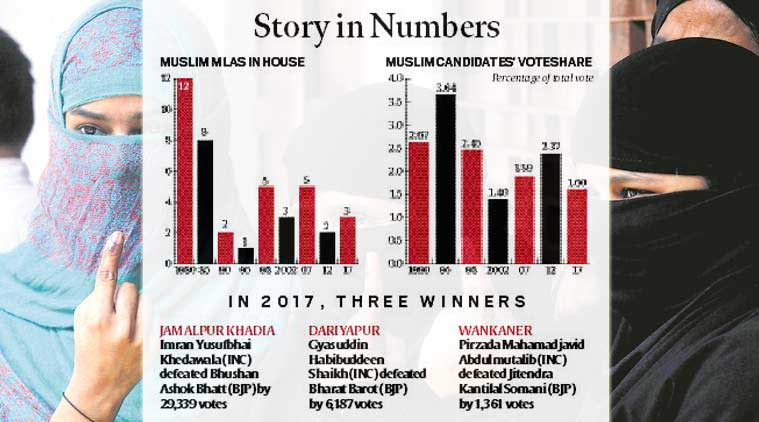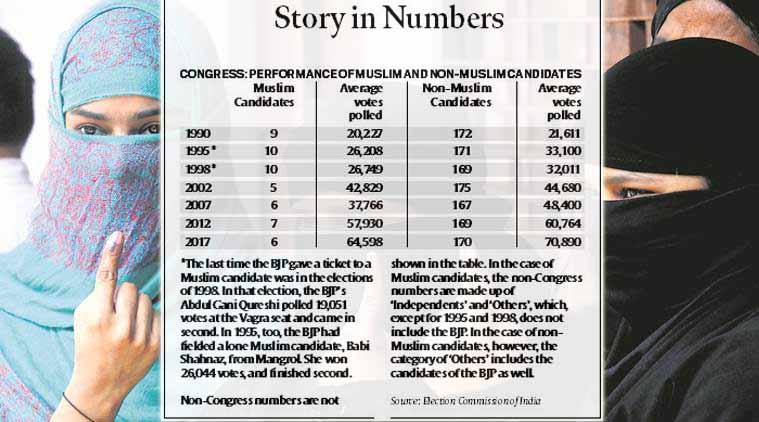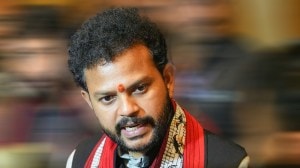Muslims in Gujarat polls: Just a few candidates, tiny voteshare
203 Muslim candidates together received 1.6% of the total vote in the 2017 Gujarat elections. Contrast this with Uttar Pradesh, where despite the BJP sweep, Muslims got 13.36% of the vote.
 Women voters at an Ahmedabad polling station on December 14. Muslims make up 9.67% of the population of Gujarat, but the community’s representation in the 182-member Assembly has not risen above five since the elections of 1990. Reuters
Women voters at an Ahmedabad polling station on December 14. Muslims make up 9.67% of the population of Gujarat, but the community’s representation in the 182-member Assembly has not risen above five since the elections of 1990. Reuters
The benefits of putting up a Muslim candidate in Gujarat are low for political parties, an analysis of election data show. As per Census 2011, Muslims make up 9.67% of the state’s population; however, the 203 Muslim candidates, who constituted 11.1% of the total 1,828 candidates in the 2017 Assembly elections, together received only 1.6% of the total valid votes polled.
The BJP, the dominant party in Gujarat for over two decades, put up a Muslim candidate each in the 1995 and 1998 elections, but none after that. Since 1990, the most Muslim candidates the Congress has put up has been 10 each in 1995 and 1998. Of the six Muslim candidates the Congress fielded in 2017, three won.
 The 1.6% voteshare for Muslim candidates in the 2017 election is the lowest since 2002 when, in the vote held some months after the riots, 57 Muslim candidates received just 2.87 lakh votes — 1.4% of the total votes polled. The voteshare of Muslim candidates rose in 2007 (116 candidates, 4.13 lakh votes) and 2012 (192 candidates, 6.51 lakh votes) before crashing in these elections (203 candidates, 5.04 lakh votes).
The 1.6% voteshare for Muslim candidates in the 2017 election is the lowest since 2002 when, in the vote held some months after the riots, 57 Muslim candidates received just 2.87 lakh votes — 1.4% of the total votes polled. The voteshare of Muslim candidates rose in 2007 (116 candidates, 4.13 lakh votes) and 2012 (192 candidates, 6.51 lakh votes) before crashing in these elections (203 candidates, 5.04 lakh votes).
The contrast between the Gujarat numbers and those in Uttar Pradesh are stark. Muslims are 19.26% of UP’s population, as per Census 2011 data. Even in the wave that propelled the BJP to 312 (out of 403) seats on its own in the 2017 Assembly elections, Muslim candidates drew 13.36% of the total votes polled.
Decoding the BJP’s victories: Trends of continuity with some significant change

In Gujarat in 2017, each Muslim candidate polled 2,487 votes on average, while each non-Muslim candidate got 18,292 votes, more than seven times more. The gap was narrower for the six Muslim candidates fielded by the Congress, each of whom got 64,598 votes on average, compared to 70,890 votes for each of the party’s 170 non-Muslim candidates on average.

Twelve Muslims were elected to the Gujarat House in 1980; thereafter, their numbers fell as the BJP consolidated itself in the state’s politics. In 1995, when the BJP first came to power on its own, only one Muslim made it to the Assembly. The four subsequent elections in 1998, 2002, 2007 and 2012 saw five, three, five and two Muslim candidates winning respectively, before the three who won this year. Communal polarisation has gone hand in hand with the electoral marginalisation of Muslims.

- 01
- 02
- 03
- 04
- 05






































